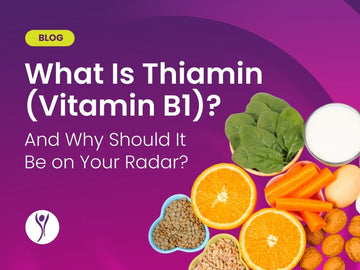by Brenda Hoehn on Sep 22, 2025

What Is Thiamin (Vitamin B1), and Why Should It Be on Your Radar?
Let’s get right to it—thiamin, also known as vitamin B1, is essential for converting food into energy and supporting the nervous system. Since thiamin is water-soluble and not stored in large amounts, your body needs a steady supply from food or supplements.
This vitamin is especially important for individuals who have undergone metabolic surgery or are on a medical weight management plan, where changes in digestion and nutrient intake can increase the need for key nutrients like thiamin.
How Thiamin Supports Energy Metabolism
Thiamin plays a foundational role in helping the body turn carbohydrates into energy. It supports the production of ATP (adenosine triphosphate), the energy “currency” used by your cells.
Low thiamin levels may contribute to symptoms like fatigue or low energy. After metabolic surgery, individuals may not absorb or consume enough thiamin from food alone, which is why this nutrient often becomes a focus in postoperative care.
Nervous System Health and Thiamin
Thiamin supports normal nervous system function by helping the body maintain neurotransmitter activity and myelin, the protective sheath around nerves.
This matters for everyone, but especially for those with increased nutrient needs or absorption challenges. Maintaining adequate thiamin levels can support overall wellness and contribute to mental clarity, focus, and nerve signaling*.
Understanding Thiamin Deficiency
In some cases—particularly when intake is limited, vomiting is prolonged, or nutrient absorption is impaired—thiamin levels can fall below optimal ranges. According to clinical guidelines, individuals with higher needs may benefit from proactive supplementation to maintain nutritional balance.
Low thiamin levels have been associated with conditions such as beriberi and Wernicke’s encephalopathy (WE), which are monitored closely in individuals with a history of bariatric or metabolic surgery. Thiamin isn’t stored in large quantities in the body, so a consistent intake from diet or supplements is needed. Consistent thiamin intake helps support daily nutrient needs and may help fill potential nutrient gaps.
Bariatric Surgery and Thiamin: What to Know
After procedures like duodenal switch, SADI, gastric bypass or sleeve gastrectomy, the body’s ability to absorb certain nutrients—including thiamin—may be reduced. That’s why professional organizations like the ASMBS (American Society for Metabolic and Bariatric Surgery) recommend routine thiamin supplementation for certain individuals.
Their 2025 ASMBS guidelines include:
-
Primary prevention: 100 mg of thiamin daily, starting at least 2 weeks before surgery and continuing for 3 months after
-
Maintenance: ≥12 mg daily long term
-
Higher support: In cases of low intake or deficiency, your provider may recommend higher doses under supervision
Common Food Sources of Thiamin
Many whole foods are natural sources of thiamin. These include:
-
Whole grains (e.g., brown rice, oats)
-
Lean proteins like pork and chicken
-
Legumes such as lentils and black beans
-
Nuts and seeds—especially sunflower seeds
-
Fortified cereals and nutritional yeast
For individuals with limited intake or dietary restrictions, supplements or fortified products may help support adequate thiamin levels*. Always speak with a healthcare provider or registered dietitian to determine the best option for your needs.
What to Look For in a Thiamin Supplement
If you’re considering a thiamin supplement, here are a few helpful tips:
-
Check the dosage: Some individuals may need 100 mg daily; others may require long-term support at 12 mg or higher, depending on clinical recommendations.
-
Choose a trusted brand: Look for third-party tested supplements, made in cGMP-certified facilities with clear labeling.
-
Stay consistent: Taking thiamin daily—especially if advised by your care team—can help support ongoing nutrient balance and wellness.
The Magnesium Connection
Magnesium plays an important role in how thiamin is used in the body. It helps convert thiamin into its active form (TDP or thiamin diphosphate). Without adequate magnesium, thiamin may not be fully utilized—even with regular supplementation.
If magnesium support is needed, your provider may recommend pairing your thiamin supplement with a product like ProCare Health Mag-D, which contains:
-
Magnesium
-
Vitamin D3
-
Zinc and copper
-
Calcium and vitamin C
This kind of broad-spectrum nutrient support is especially helpful for those with lab-confirmed needs or ongoing post-op nutrient goals.
Fun Facts About Thiamin
-
Thiamin was the first B vitamin discovered—hence the name Vitamin B1.
-
It’s sensitive to heat and light, so cooking methods matter!
-
Nutritional yeast is one of the most concentrated food sources of thiamin—perfect for plant-based eaters.
-
It’s water-soluble, which means any excess is naturally excreted in urine.
Your Thiamin Checklist
Want to make sure you’re supporting your thiamin needs? Here’s your quick-start guide:
- Incorporate thiamin-rich foods like whole grains, legumes, and lean proteins
- Use high-quality supplements if recommended by your provider
- Stay consistent with your daily routine
- Talk to your dietitian or healthcare provider about your lab values and any needed adjustments
The Role of Thiamin in Ongoing Support
While thiamin may be a small nutrient, it supports some of the body’s most important processes—especially for individuals navigating metabolic surgery or medical weight management. Keeping thiamin intake consistent is a proactive way to support energy metabolism, nutrient balance, and overall wellness*.
No matter where you are in your journey—pre-op, post-op, or maintaining long-term—your health deserves steady support every day.
Why ProCare Health?
We understand the unique needs of individuals on surgical, medical, and holistic weight health journeys. Our thiamin and multivitamins are:
-
Clinically aligned with ASMBS guidelines
-
Designed for everyday compliance with easy-to-swallow capsules or tasty chewable options
-
Affordable and accessible, with Price Match Guarantee™, Subscribe & Save discounts, and 2% cash back through our Loyalty Rewards Program. We intentionally reduce our margins to make sure our products are accessible—because nutritional support should never be out of reach.
-
Independently third-party tested, made in the USA, and backed by practitioner trust.
*These statements have not been evaluated by the Food & Drug Administration. Products mentioned are not intended to diagnose, treat, cure, or prevent any disease.
This blog is intended for general educational purposes only and is not a substitute for professional medical advice. Please consult your healthcare provider before making any changes to your health or wellness routine.



